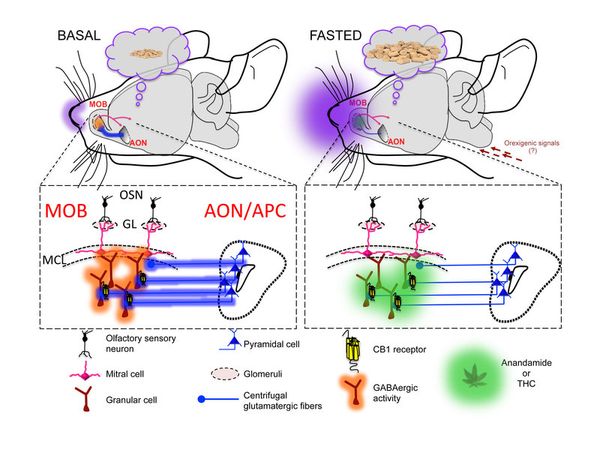- According to a study published in February in the magazine Nature Neuroscience and promoted by investigators at the French Institute of Health and Medical Research (INSERM), exogenous cannabinoids (like THC) heighten consumers' sense of smell and taste, as well as their appetites.

Marijuana can help to curb or increase one's desire to eat. That is the conclusion reached by French researchers in a study published in Nature, after gathering significant results through a range of tests on mice.
They report that the desire to eat after smoking cannabis is a result of its THC directly acting on the olfactory bulb. It is in this part of the body where marijuana increases one's sense of smell, which, at the same time, stimulates one’s appetite (because one smells the food more intensely) and makes foods much more enticing.
The researchers came to this conclusion after carrying out tests on several groups of mice. One group ingested marijuana extracts and the other did not. They later observed the animals' reactions to the presence of almond and banana oils, discovering that those which had ingested the cannabis consumed much more of these.
They ran the same test on mice without olfactory bulbs (genetically modified) and verified that the THC had no effect on them. These are tests which they have repeated regularly since 2010.

The study concludes that any effect on the main olfactory bulb of an organism impacts the way it will ingest food. The number and activity of cannabinoid receivers can increase these effects too.
According to the study's lead researcher, Giovanni Marsicano, these results could be truly valuable in the clinical area to treat people who also suffer from anorexia nervosa - who regularly find food unattractive - but also for those who suffer from obesity. Some of those suffering from eating disorders experience altered perceptions and senses. Marijuana could help to balance that perception.

Now what it is necessary to investigate, according to biologist Debra Fadool at Florida State University, is whether CB1 could also have significant results on a person or animal who has not been exposed to any food deprivation. According to Fadool cannabinoids tend to have different effects when people have already ingested foods, or when they suffer obesity.
At this time, the study, published in the prestigious journal Nature, presents experimental findings on the important effects that CB1 receptors have on all those elements that habitually impact one's sense of taste, smell and appetite.
----------
With Information from Cannasos.com, Nature.com, The-scientist.com, CBSnews.com


Comments from our readers
There are no comments yet. Would you like to be the first?
Leave a comment!Did you like this post?
Your opinion about our seeds is very important to us and can help other users a lot (your email address won't be made public).